
Korean Journal of Mathematics
Scope & Guideline
Pioneering Research for Tomorrow's Mathematicians.
Introduction
Aims and Scopes
- Pure Mathematics:
Focus on foundational aspects of mathematics, including algebra, geometry, topology, and analysis. Research in this area often explores abstract concepts and seeks to establish new theoretical frameworks. - Applied Mathematics:
Emphasis on the application of mathematical methods and theories to solve real-world problems. This includes areas such as mathematical modeling, numerical analysis, and optimization. - Statistics and Probability:
Research related to statistical methods, probability theory, and their applications in various fields. This area includes studies on statistical convergence, estimation, and data analysis techniques. - Mathematical Physics:
Interdisciplinary studies that apply mathematical techniques to problems in physics, including the exploration of mathematical structures that underpin physical theories. - Computational Mathematics:
Research that focuses on algorithms, numerical simulations, and computational techniques. This area addresses practical computational issues and the development of new numerical methods. - Geometry and Topology:
Exploration of geometric structures, topological spaces, and their properties. This includes studies on manifolds, curvature, and the relationships between different geometric objects. - Fixed Point Theory:
Investigation of fixed point theorems and their applications in various mathematical contexts. This includes studies on mappings in metric spaces and their convergence properties.
Trending and Emerging
- Fractional Calculus and Inequalities:
There is a growing interest in fractional calculus and its applications, particularly in establishing new inequalities and exploring their implications in diverse mathematical contexts. - Fuzzy Mathematics and Soft Computing:
Research involving fuzzy sets and soft computing techniques has gained traction, indicating an increasing recognition of their relevance in dealing with uncertainty and imprecision in mathematical modeling. - Nonlinear Dynamics and Chaos Theory:
Studies focusing on nonlinear systems and chaos theory are on the rise, reflecting a broader interest in understanding complex systems and their behaviors. - Computational Methods in Algebra and Geometry:
The application of computational techniques to solve algebraic and geometric problems is trending, showcasing the integration of technology with traditional mathematical disciplines. - Topological Data Analysis:
Emerging interest in topological data analysis reflects a trend towards utilizing topological concepts to analyze and interpret data, indicating a shift towards data-driven mathematical research. - Mathematical Biology and Population Dynamics:
Research that applies mathematical modeling to biological systems, particularly in population genetics and dynamics, is increasingly prominent, highlighting the interdisciplinary nature of contemporary mathematical research.
Declining or Waning
- Classical Analysis Techniques:
Traditional methods of analysis, such as those focused on classical inequalities and basic function properties, have become less prevalent as researchers explore more modern and complex analytical techniques. - Elementary Number Theory:
Research articles concentrating on basic aspects of number theory, such as divisibility and prime numbers, have decreased in frequency, suggesting a shift towards more advanced or applied number theory. - Basic Algebraic Structures:
Studies centered on elementary algebraic concepts, such as simple ring theory and basic group theory, have waned as the journal increasingly emphasizes more complex algebraic structures and their applications. - Static Mathematical Models:
There is a noticeable reduction in publications focusing on static models without consideration for dynamic systems or real-time applications, as the field moves towards more dynamic and computational approaches. - Traditional Combinatorics:
Classic combinatorial techniques and problems have seen a decline as the journal pivots toward more interdisciplinary approaches that integrate combinatorial methods with other mathematical domains.
Similar Journals

INDIAN JOURNAL OF PURE & APPLIED MATHEMATICS
Pioneering Insights in Pure and Applied MathematicsINDIAN JOURNAL OF PURE & APPLIED MATHEMATICS, published by the INDIAN NATIONAL SCIENCE ACADEMY, stands as a vital resource in the realm of pure and applied mathematics since its inception in 1996. With ISSN 0019-5588 and E-ISSN 0975-7465, this journal aims to disseminate original research that advances the understanding and application of mathematical principles. Operating out of New Delhi, India, it serves a diverse readership comprising researchers, scholars, and practitioners in the mathematical sciences. Recognized within the Q3 category in both Applied Mathematics and Miscellaneous Mathematics as per the 2023 category quartiles, the journal emphasizes rigorous peer-reviewed articles that contribute to its impact in academia, reflected in its Scopus rankings. Although it does not currently operate as an open-access journal, it maintains a commitment to quality and accessibility of scholarly content, striving to foster academic collaboration and innovation. The convergence of full-text issues from 1996 to 2024 highlights its ongoing dedication to the evolution of mathematical research.

Frontiers of Mathematics
Unlocking Potential Through Open Access MathematicsFrontiers of Mathematics, published by SPRINGER HEIDELBERG, is an emerging academic journal dedicated to fostering the advancement of mathematical sciences from 2023 to 2024. With an ISSN of 2731-8648 and E-ISSN of 2731-8656, this journal is positioned in the category of Q2 in the miscellaneous mathematics domain, showcasing its commitment to quality research and innovation. Although in its nascent stages, it has swiftly established a foothold within the global academic landscape, holding a Scopus rank of #198/399 and a median percentile of 50, indicating a promising trajectory. By providing an open-access option, Frontiers of Mathematics ensures broad dissemination of research findings, fostering collaboration and knowledge sharing across the mathematical community. Researchers, professionals, and students alike will find this journal to be an invaluable resource, contributing to important discussions and advancements in various mathematical fields.
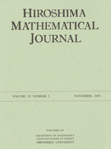
Hiroshima Mathematical Journal
Unveiling the Beauty of Numbers and GeometryThe Hiroshima Mathematical Journal, published by Hiroshima University, Graduate School of Science, serves as a prominent platform for disseminating high-quality research in the field of mathematics. Established in 1959, the journal has been an integral part of the mathematical community, focusing on areas such as Algebra, Number Theory, Analysis, and Geometry and Topology. Although currently classified in Q4 quartile rankings within its categories, the journal is committed to advancing mathematical knowledge and fostering scholarly dialogue. Its accessibility, combined with its long-standing history, makes it an essential resource for researchers, professionals, and students dedicated to exploring and enhancing the mathematical sciences. For those interested in contributing or accessing cutting-edge research, the Hiroshima Mathematical Journal continues to uphold its mission of excellence in mathematical scholarship.

Kyungpook Mathematical Journal
Empowering Research Through Rigorous Mathematical InquiryWelcome to the Kyungpook Mathematical Journal, a prominent publication dedicated to the advancement of mathematical research across various fields, including applied mathematics and miscellaneous mathematical disciplines. Published by the Department of Mathematics at Kyungpook National University in South Korea, this journal aims to disseminate high-quality original articles, fostering a deeper understanding and innovative applications of mathematical theories. With a distinguished Scopus ranking in its category, standing at Q3 in Applied Mathematics and Q3 in Mathematics (miscellaneous), it serves as a crucial platform for both emerging and renowned scholars to share their findings with a global audience. This publication is indexed in reliable databases, ensuring enhanced visibility and impact for its contributors. Even though it currently lacks open-access distribution, the journal remains an essential resource for researchers, professionals, and students looking to stay at the forefront of mathematical exploration from 2007 to 2024 and beyond. Join us in contributing to the vibrant discourse that shapes the future of mathematics.
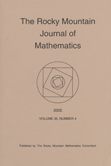
ROCKY MOUNTAIN JOURNAL OF MATHEMATICS
Bridging Disciplines, Advancing KnowledgeROCKY MOUNTAIN JOURNAL OF MATHEMATICS, published by the Rocky Mountain Math Consortium, serves as a critical platform for researchers and practitioners in the field of mathematics since its inception in 1971. With a notable presence in the academic community, this journal covers a broad spectrum of mathematical disciplines, positioning itself in the Q2 category for Mathematics (miscellaneous) as of 2023. Despite being a subscription-based journal, it is recognized for its rigorous peer-review process and contributions to theoretical and applied mathematics, helping to advance knowledge and foster collaboration among mathematicians. The journal's ISSN number is 0035-7596 and its E-ISSN is 1945-3795, reflecting its commitment to accessibility and dissemination of high-quality research. Based in Tempe, Arizona, at Arizona State University, the journal continues to play an important role in shaping contemporary mathematical discourse through well-researched articles and innovative studies, aiming to bridge gaps between various mathematical subfields and engage a diverse audience, including students and established researchers alike.
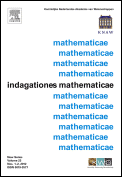
INDAGATIONES MATHEMATICAE-NEW SERIES
Advancing the frontiers of mathematical knowledge.INDAGATIONES MATHEMATICAE-NEW SERIES is a distinguished academic journal specializing in the field of mathematics, with a focus on both theoretical and applied aspects of the discipline. Published by Elsevier, a leading publisher in the scientific community, this journal has established itself as a crucial platform for the dissemination of high-quality research. With an ISSN of 0019-3577 and an E-ISSN of 1872-6100, it operates out of the Netherlands and has been a vital resource for academics since its inception in 1969. Currently, it holds a Q2 ranking in the mathematics category, signifying its relevance and impact in the field, with a Scopus rank of #222 out of 399 in General Mathematics, placing it in the 44th percentile. Although it does not currently offer Open Access options, INDAGATIONES MATHEMATICAE-NEW SERIES is committed to contributing to the advancement of mathematics by publishing original research articles, reviews, and notes that enrich the academic community. Researchers, students, and professionals alike will find invaluable insights and developments within its pages, making it a cornerstone journal for those keen on exploring the complexities of mathematics.

Science China-Mathematics
Showcasing Excellence in Mathematical ResearchScience China-Mathematics, published by SCIENCE PRESS, is a premier peer-reviewed journal dedicated to the dissemination of significant new findings in the field of mathematics. With an ISSN of 1674-7283 and an E-ISSN of 1869-1862, this journal has established itself as a vital resource for researchers and professionals since its inception. Recognized in the Q1 category for Mathematics (miscellaneous) and holding an impressive rank of #75 out of 399 in the Scopus Mathematics General category (81st percentile), the journal showcases cutting-edge research and theoretical advancements. Committed to promoting open access, the journal ensures that high-quality mathematical research is accessible to global audiences, empowering researchers, students, and professionals. Spanning from 2010 to 2024, Science China-Mathematics plays a crucial role in the unification of mathematical knowledge and encourages collaboration across disciplines.

Matematicki Vesnik
Connecting scholars through open-access mathematics.Matematicki Vesnik is a distinguished open-access journal published by the MATH SOC SERBIA-DRUSTVO MATEMATICARA SRBIJE, dedicated to advancing the field of mathematics since its inception. With an ISSN of 0025-5165 and an E-ISSN of 2406-0682, this journal has been a significant platform for disseminating research findings since its establishment in 1993. Hosted in Serbia, it embraces a broad scope of mathematical discourse while achieving a Q3 category ranking in miscellaneous mathematics for 2023. As part of its commitment to fostering scholarly communication, Matematicki Vesnik is accessible to a global audience, promoting high-quality research and innovative ideas within the mathematical community. With converged years from 1999 to 2024 and a Scopus rank of #232 out of 399 in General Mathematics, the journal plays a crucial role in enhancing visibility and impact for researchers, professionals, and students alike in the dynamic landscape of mathematical inquiry.
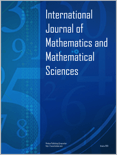
INTERNATIONAL JOURNAL OF MATHEMATICS AND MATHEMATICAL SCIENCES
Advancing mathematical frontiers since 1978.INTERNATIONAL JOURNAL OF MATHEMATICS AND MATHEMATICAL SCIENCES is a distinguished peer-reviewed journal published by HINDAWI LTD, dedicated to advancing the field of mathematics and its various applications. Since its inception in 1978, the journal has been committed to open access, ensuring that research is freely available to all, thereby fostering greater collaboration and dissemination of knowledge. With an impressive Q3 ranking in the Mathematics (miscellaneous) category and a notable Scopus rank in the 72nd percentile, this journal is a vital resource for researchers, professionals, and students. The journal covers a wide range of topics in mathematics, from theoretical explorations to applied methodologies, and it continues to serve as a platform for significant contributions in this evolving discipline. Its continuous publication from 1978 to present reflects its enduring relevance and impact in the mathematical sciences community.
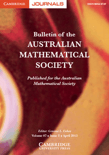
BULLETIN OF THE AUSTRALIAN MATHEMATICAL SOCIETY
Advancing Mathematical Frontiers Since 1969BULLETIN OF THE AUSTRALIAN MATHEMATICAL SOCIETY is an esteemed journal dedicated to advancing the field of mathematics, published by Cambridge University Press. Since its inception in 1969, this periodical has fostered scholarly communication and showcased pivotal research in various domains of mathematics, now projected to continue until 2024. With an impact factor that places it in the Q2 category of miscellaneous mathematics research, it holds a notable position among its peers, ranking 215th out of 399 in the Scopus database. Though it does not currently offer open access options, the journal remains a vital resource for researchers, professionals, and students seeking to deepen their understanding of mathematical advancements. The Bulletin serves as a crucial platform for disseminating original research, comprehensive reviews, and insightful perspectives that navigate the complexities of mathematics today, ensuring the community is well-informed and engaged.